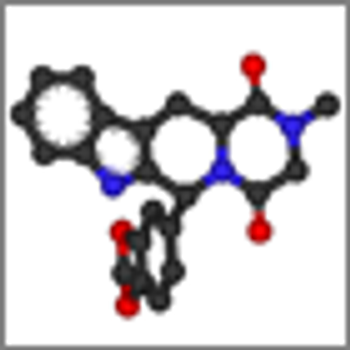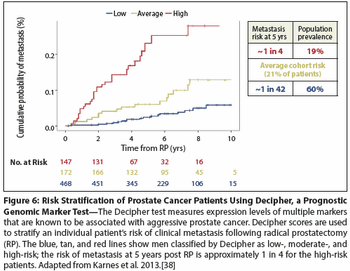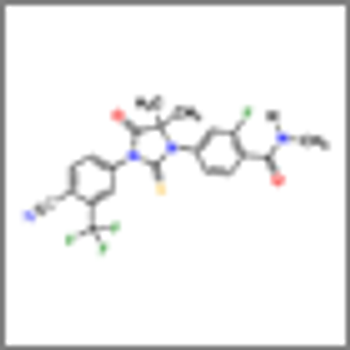
In a recent study, the drug tadalafil (Cialis) did not improve erectile function in men undergoing radiation therapy for prostate cancer.

Your AI-Trained Oncology Knowledge Connection!


In a recent study, the drug tadalafil (Cialis) did not improve erectile function in men undergoing radiation therapy for prostate cancer.

Patients with localized prostate cancer treated with primary androgen deprivation therapy (ADT) without radiation therapy or surgery derived no survival benefit, according to the results of a large study.

There is no question that radiopharmaceuticals have a role in the management of patients with metastatic bone disease. There is also no question that fractionated external beam radiotherapy (EBRT) is highly effective and generally well tolerated when delivered with large open or focal fields.

In order to achieve maximum survival of patients with metastatic castration-resistant prostate cancer, the judicious use of all available effective agents and modalities is required. Both EBRT and radium-223 are effective at relieving pain, but both may decrease bone marrow function.

As new data and new treatment options emerge, palliative radiotherapy algorithms will need to undergo continuous modifications and updates to ensure that patients receive optimal symptom relief.

Moving forward, perhaps no recent development in the use of RT in metastatic prostate cancer has captured greater attention than the use of radium-223 in metastatic castration-resistant prostate cancer (mCRPC).

This review will include discussion of the role of radiation therapy for osseous metastases and metastatic spinal cord compression, as well as the use of radiopharmaceuticals for painful osseous metastases.

It is important for all of us now and then to take a step back and recapture the wonder that we all felt at the onset of our careers, when treatments we now consider simple and routine held an aura of miracle. For me, a little bit of that wonder returns every time I treat a patient with a bony metastasis-in particular, from prostate cancer.

In a recently published study, younger men who undergo a prostatectomy for their prostate cancer cut their relative risk of dying from prostate cancer by 55%, and those with intermediate-risk disease cut their relative risk of dying from prostate cancer by 62%.

In this interview we discuss the role of early treatment, active surveillance, and watchful waiting in patients with PSA-detected early-stage prostate cancer.

New data from the long-term SELECT trial shows that men given high-dose supplementation of both selenium and vitamin E had a higher risk of developing high-grade prostate cancer.

Patients treated with a newer, faster, and less expensive type of radiotherapy also have higher rates of urinary complications, according to a new study.

An intense higher-dose radiotherapy regimen may be a better treatment option for men with localized prostate cancer, according to the 10-year results of the international phase III RT01 trial.

Improved early detection of prostate cancer would ideally involve a noninvasive test that allows clinicians to distinguish aggressive cancers from relatively indolent ones. This distinction is especially important given that relatively few men who undergo screening are destined to die of prostate cancer.

For those undergoing screening for the presence of previously undiagnosed prostate cancer, the major challenge for new tests is to avoid the overdetection of indolent cancers that limits the clinical utility of the prostate-specific antigen (PSA) test.

The benefit-to-risk trade-offs associated with PSA screening are highly sensitive to patient preference, underscoring the importance of ensuring that men have the opportunity to decide for themselves whether they wish to have their individual risk for suffering and death from prostate cancer assessed through PSA screening.

Many urologists believe that all men, regardless of risk, should be offered a baseline prostate-specific antigen (PSA) test at age 40 years. I was once one of those urologists.

In this article, we review recent advances in the discovery of prostate cancer biomarkers, their integration into clinical practice, and implications for improving clinical management of the disease.

In a new prospective study on the role of dietary lycopene in reducing the risk of prostate cancer, researchers found that consuming foods high in lycopene is linked to a reduced risk of lethal prostate cancer.

In this interview we discuss prostate cancer highlights from the 2014 ASCO Genitourinary Cancers Symposium.

Adding a treatment course of local radiotherapy to hormonal treatment in men with locally advanced or high-risk prostate cancer more than halved the 10-year and 15-year prostate-cancer–specific mortality.

Androgen inhibition with enzalutamide significantly reduced the risk of disease progression and increased survival among men with previously untreated metastatic prostate cancer, according to the results of the phase III PREVAIL trial.

A personalized tool to predict the chances of a prostate cancer overdiagnosis has been developed and could enable better decision-making and tailored patient treatment.

As long as there is any risk of progression, G6 cancer cannot be equated to just a precursor lesion, and the emphasis should remain on screening patients with serum PSA measurement, contrary to the recommendation of the US Preventive Services Task Force.

While there is no doubt that many indolent prostate cancers have been treated, it is unclear where one should draw the line between indolent and aggressive tumors.